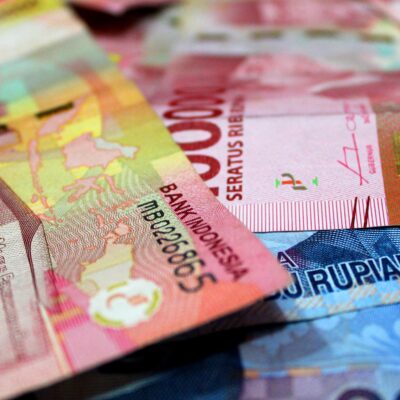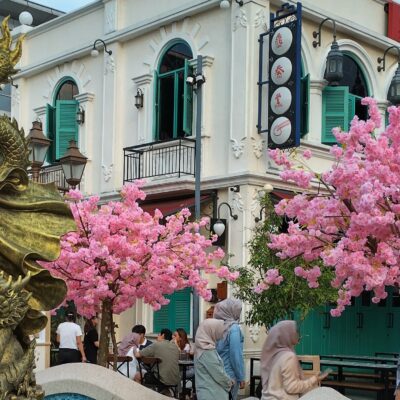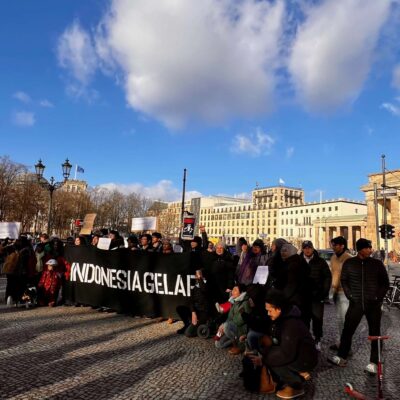The COVID-19 pandemic has reshaped the way people think of and experience travelling. Using the Sangihe communities in north-eastern Indonesia near the sea border with the Philippines as a case study, I seek to understand why people decided to travel (or not) during the pandemic, and what their experiences were like.
I was born and lived most of my life on the Indonesian island of Java, and in 2012, was fortunate to be given the opportunity to live for a year on a small island in the north-eastern Sangihe district. Reflecting on my past experience and inspired by the work of human and cultural geographers, including in the context of everyday commuting and other forms of public transport, as well as queer and feminist scholars on migration and evacuation/emergency situations, I was keen to understand how the pandemic has influenced the way people living in small islands perceived ‘travelling’ and what it means to them as ‘small islanders in the frontier’ of an archipelagic country.
I explored this topic through in-depth interviews with 45 people and followed up with household surveys with 24 of them, as well as six focus group discussions with additional participants. A total of 60 participants with variety in age, gender and occupation were recruited through consultation with the village/hamlet chiefs and existing participants.
Relativity of space and distance on human mobility in small islands
People living on the small islands of Sangihe travel in many ways and there are at least four typologies based on their patterns of mobility and distance/ destination:
- Daily mobility within Sangir Besar (the main island of Sangihe), usually to sell/ purchase produce in the wet market, visit relatives, work, study or access basic services. For example, someone who lives in Tahuna (the capital city of Sangihe) may travel to Manganitu (five kilometres to the north, still in Sangir Besar) for schooling.
- Mobility within Sangihe district, but among the northern islands, for instance, travel from Tahuna to Marore island for work or to visit relatives. Mobility from Sangihe to two neighbouring districts, namely the archipelagic district of Talaud or to the archipelagic district Sitaro (Siau Island, Tagulandang Island, and Biaro Island). Travel to Talaud is considered as ‘faraway travel’ and is rarely undertaken by most people because it takes up from 15 hours to three days depending on the speed/ type of vessel and the weather.
- Mobility from/to Sangihe–Manado (in the main island of Sulawesi). This travel is often associated with work, visiting relatives, attending social events, and accessing more comprehensive health and other services (such as registering businesses, applying for/extending business permits, etc.).
Map of the Archipelagic District of Sangihe (in green), and North Sulawesi Province, Indonesia (grey).
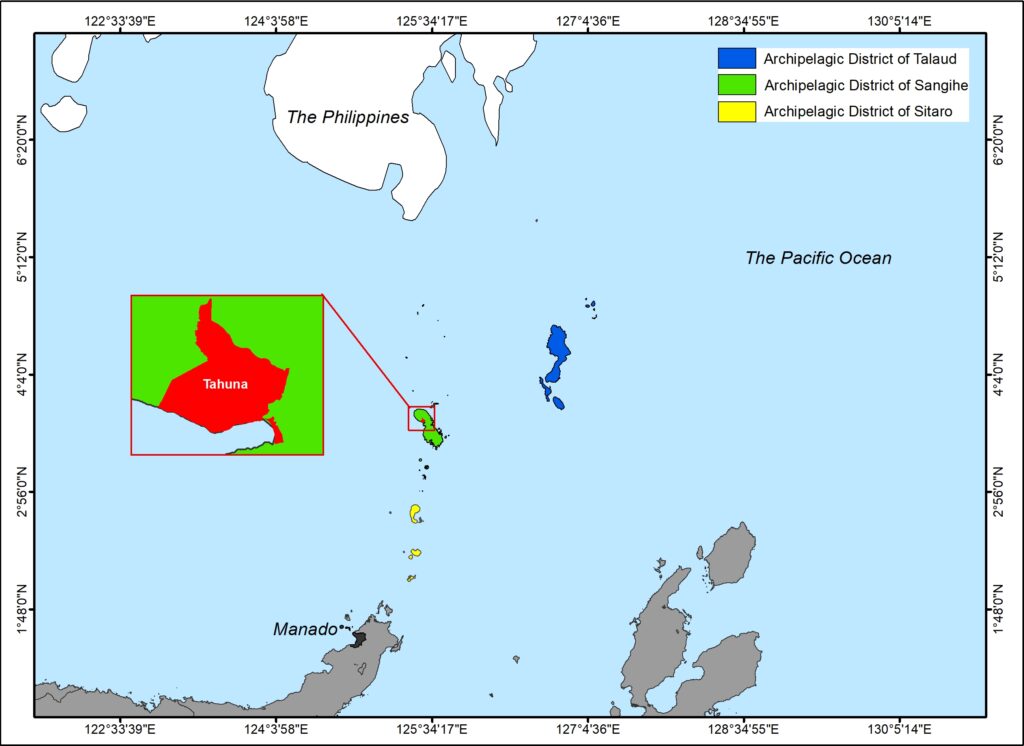
The main island is Sangir Besar and Tahuna is the main city. Copyright: Author.
Who travels, who doesn’t and why?
When discussing (im)mobility during the pandemic, exploring the key drivers for travelling becomes crucial to understand who travels, who doesn’t and why.
Travelling during the pandemic, especially in relation to the last three typologies, was not only costly but also perceived to involve a higher risk of exposure to COVID-19 due to longer travel times in only semi-open spaces with less than two metres between individual passengers. During some periods of the pandemic, passengers were subject to public health regulations, such as having to take rapid antigen tests before travel (and sometimes also on arrival in the destination port), wearing face masks and showing proof of vaccination to public health officials at ports.
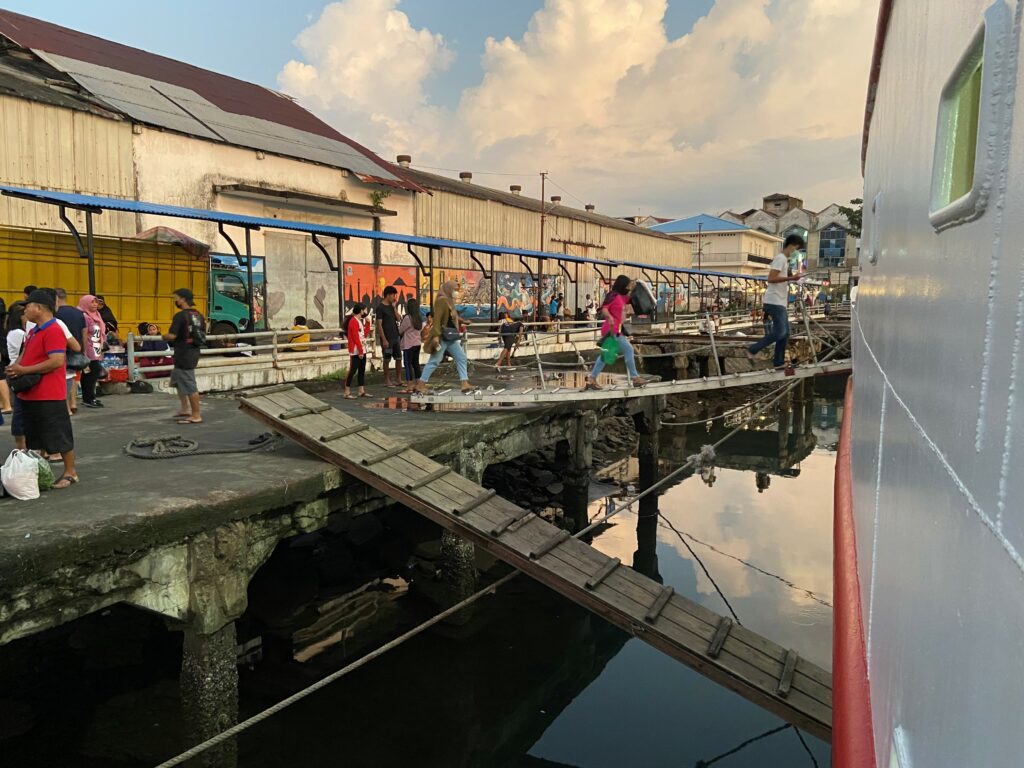
Boarding the Merit Teratai in Manado Port before leaving for Tahuna Port, June, 2022. This trip takes 8-10 hours depending on weather and the speed of the boat. Image copyright: Author.
Perceptions of ‘urgency’, affected by economic reasons and ‘perceptions of distance and time’, were found to constitute a level of perceived risk, which informed decisions to go or stay put. While people were aware of the risks of getting exposed to COVID-19 during the trip and at their destinations, some still decided to travel for many different reasons. Seeking medical care was one of the driving factors for continued human mobility, despite the risk of contracting COVID-19. This situation was explained by an elderly female participant, a micro-shop owner in Tahuna:
‘My daughter and I went to Manado during the peak of the pandemic as she needed help with her pregnancy. The unborn baby was found to be tangled with the placenta, and the doctor here (in Tahuna) told us to seek for better medical facilities in Manado (in the main island of Sulawesi). We did not wish to go as it was in the middle of the (pandemic) situation, but we had to. We lived there (in Manado) for three months in a rent-one room flat. I brought small-stove and coconut oil (from Tahuna) to cook ourselves so we can save some money.’
During the interview, she was feeding the baby: ‘this is my granddaughter’ she added with a smile.
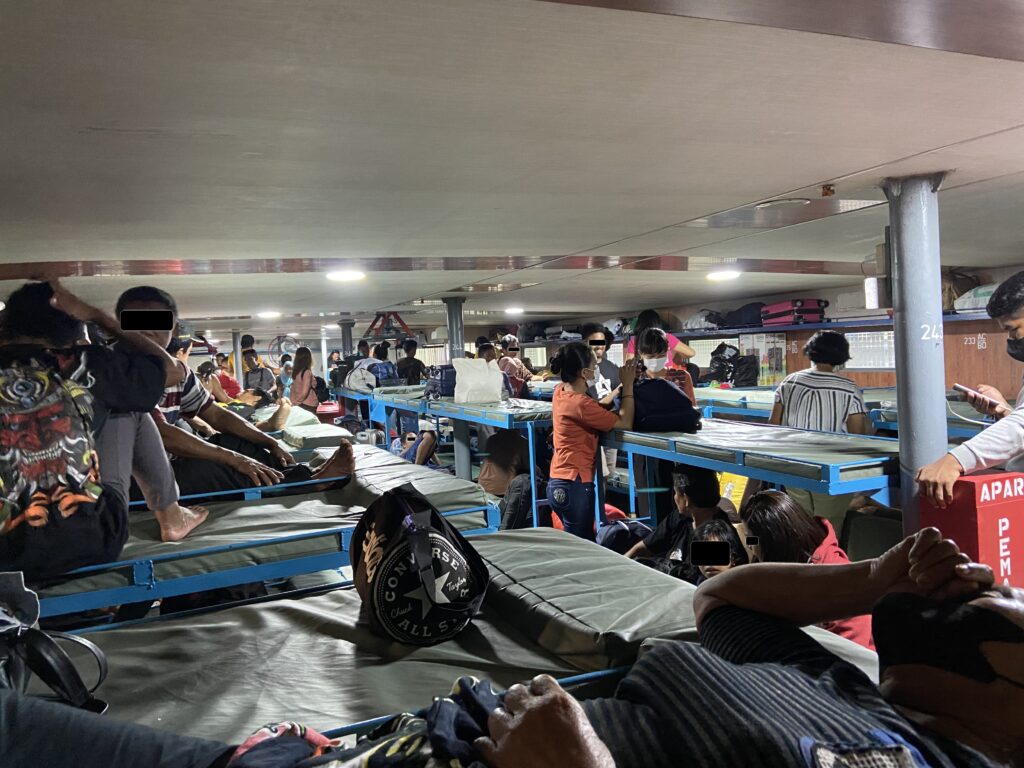
Inside the Merit Teratai from Manado to Tahuna (a round-trip service is available three times a week), June 2022. Image copyright: Author.
Many people, especially the elderly, elected not to travel during the peak of the pandemic in North Sulawesi (the end of 2020 to mid-2021), unless it was related to emergency health reasons (or sometimes urgent economic reasons). An elderly former village chief (Kapita Laung) said he and his wife went to Manado to treat his coronary artery disease:
‘It was really hard. I was sick, the (hospital) treatment was expensive, and even more with additional rapid test that costs IDR 165.000 per person [AUD 17]. We do not have much cash (circulating) in here [a smaller island in the south-eastern of Sangir Besar]. Passengers were required to wear masks all the time on the boat, it felt suffocating. But I am too afraid to take of my mask, afraid of being exposed by corona (virus).’
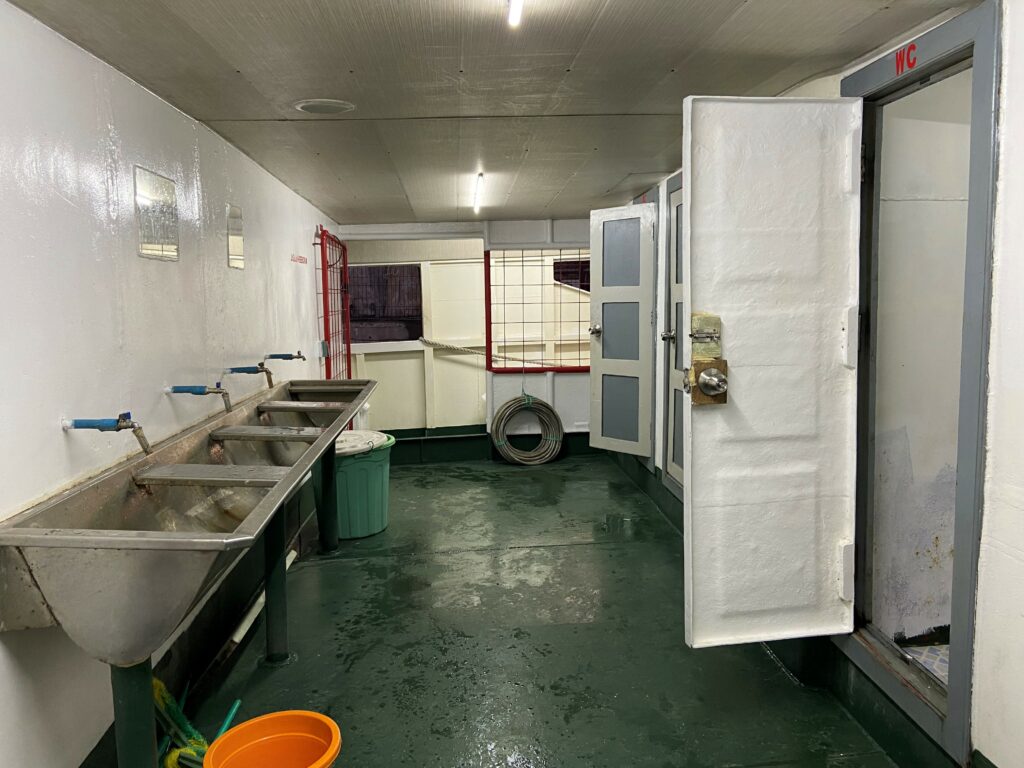
The toilets and hand wash basins on the Tahuna-Manado boat, June 2022. Image copyright: Author.
For others, mostly men of all ages, economic reasons were often enough incentive to keep travelling. They primarily travelled to the main island of Sulawesi or to the northern-most islands of Sangihe as fishing fleet/pajeko crews (‘kapal Tuna’ and ‘kapal Cakalang’) or construction workers for ports, tidal wave breakers, or other infrastructure projects. Sometimes, financial hardship caused by factors such as low fish prices, people trying to save money by not spending, and lack of fish due to unpredictable weather, pushed male breadwinners to travel to places they perceived as ‘far away’ from home. For other men, when someone else within the household provided income for the household (such as their wife, children or grandchildren), they decided against travel, and fished within their home communities. Other disincentives to travel included extra costs associated with rapid antigen tests and the extra time needed to clear health checks at the departing port. ‘My son works, so we survived. It was not much, but I fish for us to eat. I wanted to wait until the situation gets better’ (before he travels again) said an elderly male former schoolteacher in Tahuna. A 56 year old female fish seller in Tahuna echoed the decision to postpone travel when the reason was deemed as ‘not urgent’, ‘I missed them (her relatives), but we waited until the situation gets better, when they (the government) said the pandemic is gone (the cases reduced), then we went to Manado to visit.’
Almost all participants who travelled in the past two years said that they still enjoyed the boat ride. Most said that the upper deck and the side-deck were nice spots where they could feel the ocean breeze. As one male participant in Tahuna said, “When the weather is good (teduh – not windy, not raining), I liked to stare at the sky, the stars. This is why it is fun to travel by sea. You do not have to wear mask outside, so I could breathe easily. I could stretch my legs and walk.”
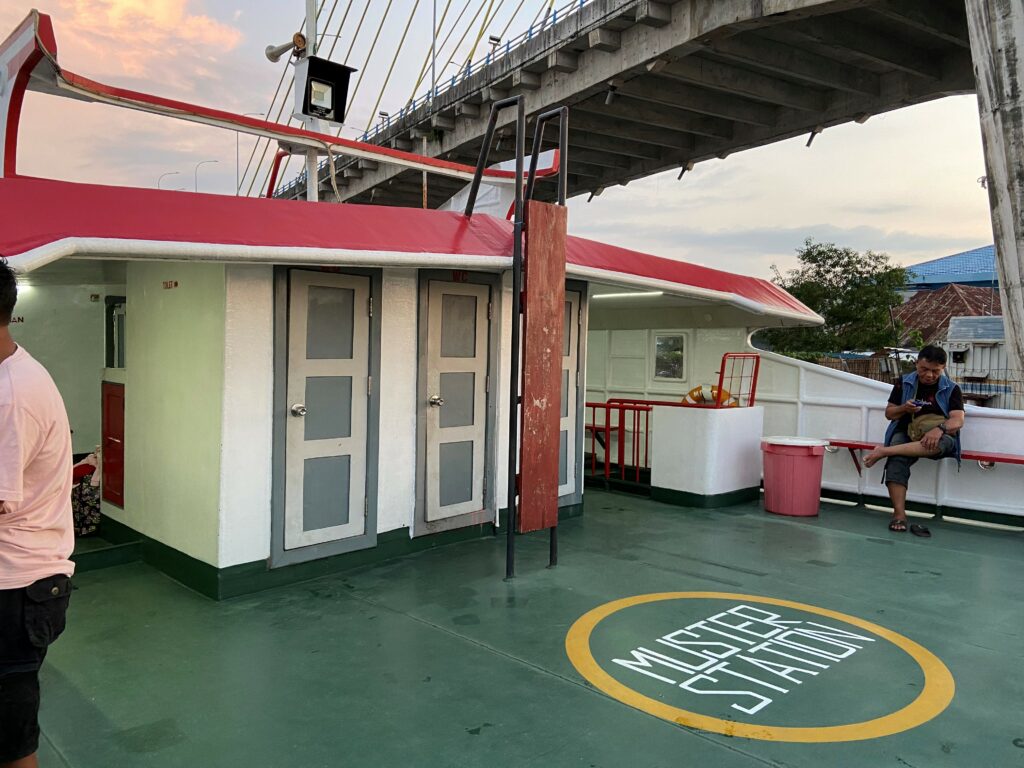
The upper deck of the Merit Teratai, where people like to sit down or have a walk around in open space, June 2022. Image copyright: Author.
The time needed to travel was also a strong factor in individuals’ decisions: long trips in term of hours of travel were less frequent during the pandemic. While physical distance matters, time needed to travel shaped their ‘perception’ of subjective distance; and it affected decisions to travel or stay put. The Tahuna-Manado trip is approximately 250 kilometres and takes 8-10 hours by sea, and is considered ‘less far’ than the Tahuna-Talaud trip which is approximately 160 kilometres but takes 10 hours to three days depending on the duration of each stop at several islands on the way. A sense of familiarity of the travel experience also influenced individuals’ decisions. A male respondent on his late 30s who was originally from Talaud but now lives in Tahuna, explained, ‘the arrangement of the bed, the situation inside the boat, and even shape and size of the fleet, it feels like we travel far away… You do not need to prepare a lot when you want to go to Manado, just come to ticket locket seller in the morning before your evening sail. But it’s totally different when you wish to travel to Talaud, you must check and ask the port officer, ‘is the boat here yet?’ and monitor (if the boat has arrived).. if you’ve missed it, you must wait for the next trip in two to three weeks’ time.’
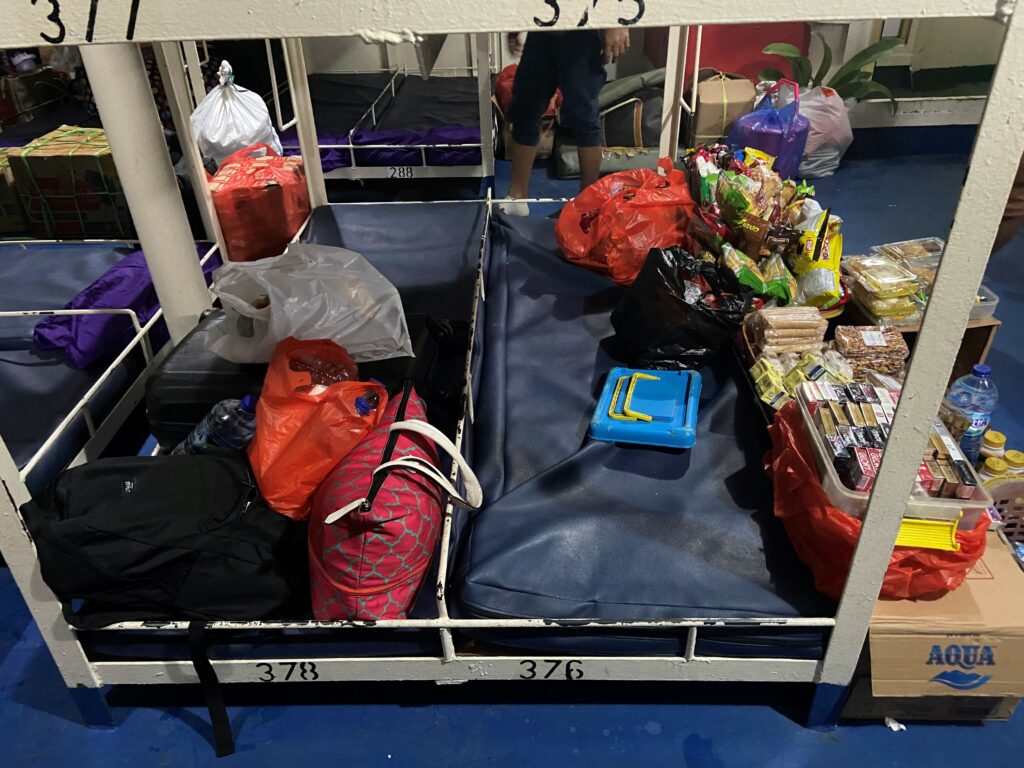
The author’s bed next to a temporary ‘microshop’ operated by a woman who sold snacks, pre-packed-meals, water, cigarettes, black coffees, and candies.
Air travel, by far, is the most uncommon way of travelling for small island communities in Sangihe. Out of 60 people I talked to and more than 100 hours of casual chats with men and women of various ages, no one in the past five years flew from Tahuna to Talaud or Manado. A woman in her mid 20s, who works in the airport said, ‘Working for three years (in Naha Airport in Tahuna) only government officials use the airplane. Sometimes we have guests from Manado or Jakarta or other places (who take the airplane). Some other times, a few businesspeople took airplane.’ With a price tag of IDR 700.000–1.2 million per trip per individual, as one participant said, ‘I could take my whole family on the boat with that amount of money to Manado or Melong (an airport in Talaud).’ Three participants went to Jakarta by plane (Tahuna–Manado by sea, followed by car to the Sam Ratulangi airport in Manado, and then by plane to Jakarta, a 2-3 day trip), and for all of them, it is ‘the big and uncommon travel’. A teacher in his late 40s said, ‘travel by plane is (an) interesting experience. It is an experience that comes once in lifetime. I did not know how to start: Where to buy the ticket? How to get in the plane? What to bring inside the plane? The airport also seems professional and (well) arranged. When you are on the plane, you got scared at first, especially when it took off, but you enjoyed it.’ Thus, subjective distance is understood as a combination of a physical miles-away from ‘home’, time needed to travel, and the familiarity (or lack thereof) of the embodied experience of such travel.
The level of ‘urgency’, relating to factors such as health, income and perceptions of distance, have shaped the way small island communities perceived the ‘risk’ of travel during the pandemic. This combination of factors informed decisions to travel or stay put until the ‘situation gets better’. People who travelled did not feel totally safe from COVID-19 despite mask wearing, handwashing and keeping a distance from other passengers. Yet, by taking these actions, they felt ‘more secure’ and ‘protected’. One traveller said: ‘I applied hand sanitiser often, before eating, after using the toilet’, and so ‘we have done what we could, but if we catch the virus somewhere, it is beyond our control, it is fate’.
There may be vulnerable groups who urgently need(ed) to travel, but were not able to for various reasons, such as lack of money and sickness. This kind of immobility becomes a social justice issue, particularly if it decreases access to basic services. The role of transport, particularly sea transport in the context of small islands, is pivotal in facilitating access to social, health, and economic opportunities. It is part of the enabling ecosystem for small island communities to access a broader range of services and opportunities; and in turn may contribute the imaginaries and the ongoing making of islandness. Living and being as islanders in the frontier of an archipelagic country has set certain expectations and perceptions of travelling as a means to exercise their social, political, and economic rights, while, feeling emotionally connected to Indonesia, especially when they are able to travel to the main city of North Sulawesi (Manado). However, in this ongoing and dynamic process, communities must deal with many uncertainties, such as weather, extreme weather events, and the COVID-19 pandemic (or any infectious disease) and this may complicate the idea of the infrastructures of (im)mobility and aspirations for mobility and connectivity, both in the present and the future.
Acknowledgement
The author would like to thank Melbourne Research Scholarship for the PhD scholarship, and to Melbourne Sustainable Society Institute for the Research Seed Fund 2021, which has enabled this fieldwork to happen. The author also would like to thank all colleagues and friends in Tahuna, Fransiska Limbengpiah and colleagues from Politeknik Nusa Utara Sangihe (Prof. Frans Grueber Iyong, Dr. Walter Balansa, Christian Manansang, Joddy Kakambong, and Meita Toppol) for assistance in the field; and to Sakaeng Solata (Stenly Takarandehang and Stenly Pontolawokang) as well as Radio Republik Indonesia Tahuna Pro 2 (Kak Julfan) for their welcoming and kind gestures, and opportunity to share this outsider view of the human mobility and connectivity of small-frontier islands communities (via RRI Tahuna radio broadcast). This piece will be developed into a paper, co-authoring with Dr. Ariane Utomo and Enci Fransiska Limbengpiah; and the draft paper was presented in the Indonesia Regional Studies Association (IRSA) Conference in Lombok Island of West Nusa Tenggara Indonesia in 18-19 July 2022.
Main image: The Merit Teratai in the capital of the Sangihe Islands, Tahuna, which provides a passenger service from Tahuna to Manado, June 2022. Image copyright: Author.

